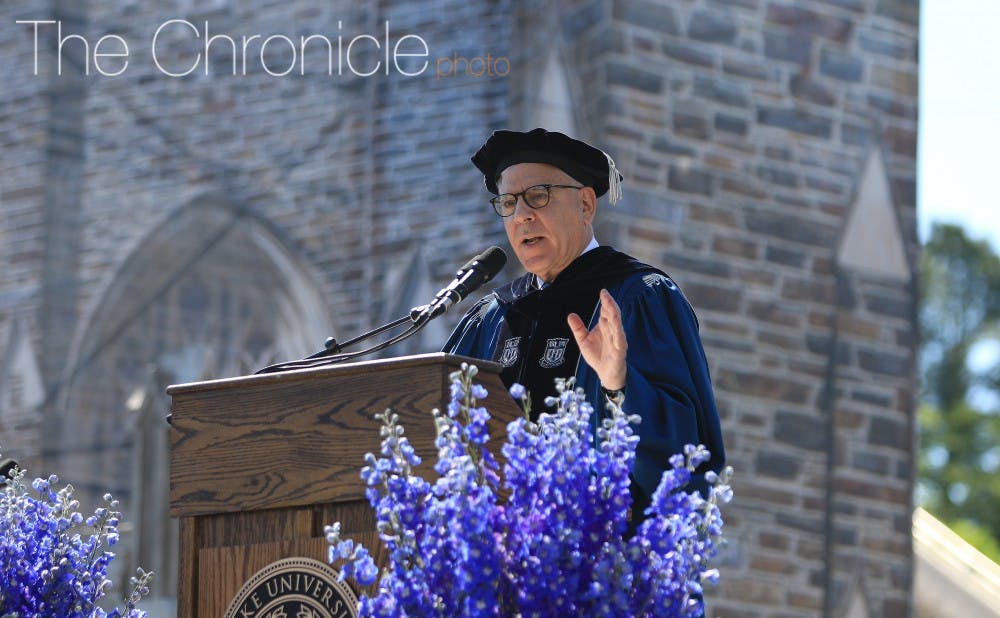At a talk at the Council of Foreign Relations on June 13, CNN host Fareed Zakaria thanked David Rubenstein for his leadership as chairman of the Board of the Council of Foreign Relations right before he interviewed Speaker of the House Nancy Pelosi.
“So if David Rubenstein offers to renovate the Longworth Office Building," Zakaria said, referring to an office building for the House of Representatives, "I would—I would wonder about that because, you know, maybe on your next foreign trip you’ll turn on the TV and discover that David is—,”
"Speaker," Pelosi interjected, which was met with laughter from the crowd.
Ever wonder why Rubenstein’s name can be found all over Duke’s campus? You’re not alone—his name is just as prevalent in Washington, D.C.
Rubenstein, Trinity ‘70, is the co-founder and co-executive chairman of the The Carlyle Group—an investment firm based in the District—and a former chairman of the Duke Board of Trustees. He served as a member from 2005 to 2017 and was chair from 2013 until the end of his tenure.
Pelosi noted that Rubenstein serves as the chairman of the Board of Trustees of both the John F. Kennedy Center for the Performing Arts and the Smithsonian Institution, in addition to his role with the Council for Foreign Relations.
Pelosi emphasized the distinction of his leadership and thanked Rubenstein for being so involved in the arts and education. She even mentioned Duke.
“David, thank you for being the person who you are, doing so many things in the arts, and education—oh, and Duke University—well, the list goes on and on,” Pelosi said.
Ranging from the National Museum of African American History and Culture to the Renwick Gallery, Rubenstein is a major donor to various museums and institutes in Washington. The Chronicle looked into some examples of his philanthropy in education and the arts in the nation’s capital, as well as at Duke.
Rubenstein could not be reached for comment.
Education, history and animals
Possibly the most famous of the documents Rubenstein owns is Magna Carta. The charter, considered a foundational document in the history of democracy, was signed by King John of England in 1215 and provided rights to barons at the time that were later extended to citizens.
Lent to the National Archives, Magna Carta resides in a permanent exhibition named after the philanthropist—the David M. Rubenstein Gallery. The exhibition inside the gallery, “Records of Rights,” focuses on the rights of groups who have long fought for equality and equity in the United States.
The philanthropist also has copies of documents vital to securing rights to Americans, including the Emancipation Proclamation and the 13th Amendment, loaned to the National Museum of African American History and Culture. Rubenstein’s website notes that he owns a second copy of the Emancipation Proclamation, and it will be loaned to the National Archives.
Rubenstein owns four of the Stone Engravings of the Declaration of Independence. He has lent them respectively to the National Archives, National Constitution Center, State Department and New York Historical Society.
Rubenstein’s generosity has also extended to the National Zoo, where he has donated in order to support elephants and pandas.
Regarding his support for the preservation of pandas, he donates money to the Smithsonian’s National Zoo and Conservation Biology Institute, which uses the money for the David M. Rubenstein Family Giant Panda Habitat and the David M. Rubenstein Fellows for conservation biologists.
He has also contributed millions of dollars to renovating famous memorials, including the Belmont-Paul Women’s Equality National Monument, Iwo Jima Memorial, Washington Monument and the Lincoln Memorial.
The Arts
Rubstenstein, as chairman of the Kennedy Center, donated an organ to the Center, now named the David M. Rubenstein Family Organ. The gift was in honor of the 40th anniversary of the Kennedy Center and the 80th anniversary of the National Symphony Orchestra.
He also donated $50 million to the Kennedy Center toward the Center’s $100 million expansion goal.
Along with other donors, Rubenstein was a part of the $30 million renovation to the National Gallery of Art’s East Building. He is also a general trustee of the museum’s Board of Trustees.
Duke University
At Duke, Rubenstein’s contributions include donating funds for buildings and the creation of a scholarship program.
Rubenstein Hall is one of two buildings that comprise the Sanford School of Public Policy. It holds the Center for Child and Family Policy and the Center for International Development. In 2005, the hall was formally dedicated and featured an inaugural speech by Colin Powell, who had just retired after serving as U.S. secretary of state.
Named the David M. Rubenstein Rare Book and Manuscript Library, the special collections library at Duke includes a rare book classroom, a photography gallery and a special collections reading room.
He has also donated to Duke Athletics, the Innovation and Entrepreneurship Initiative and Jewish Life at Duke.
Most recently, Rubenstein provided a $25 million donation to create a 70,000 square-foot arts center, now known as the Rubenstein Arts Center or “The Ruby.”
There’s even a link between Rubenstein’s philanthropy at Duke and in Washington—the conference center at the Duke in D.C. office on Pennsylvania Avenue is named after him.
Get The Chronicle straight to your inbox
Signup for our weekly newsletter. Cancel at any time.

Stefanie Pousoulides is The Chronicle's Investigations Editor. A senior from Akron, Ohio, Stefanie is double majoring in political science and international comparative studies and serves as a Senior Editor of The Muse Magazine, Duke's feminist magazine. She is also a former co-Editor-in-Chief of The Muse Magazine and a former reporting intern at PolitiFact in Washington, D.C.

